There's more to life than being a passenger...
- Jordan Milano Hazrati

- May 16, 2021
- 23 min read
Updated: Oct 25, 2022
(Amelia Earhart)
'Mum, Dad, I want to learn to fly a plane'. A very simple phrase that I remember saying once upon a time, and one that kickstarted an addictive love affair with this truly amazing experience. In this post I'm going to tell my story so far, whilst also answering some of the most common questions I'm asked as a pilot undergoing training.
It wasn't really a surprise to anyone that whilst I was loving my life in the cabin, I also wanted to sit behind the controls at the pointy end. I think my family just gave a small nod of 'of course you do', knowing full well that I meant every single word of what I'd just said, and that like everything in life, they were going to support me fully every step of the way. I am fascinated by aircraft, the mechanics and engineering, history, livery, configurations, investigations and pretty much anything that comes up when you think of aviation. I love a challenge, and am always looking for new ways to better myself, and my skills. So for my birthday one year, I was gifted a trial lesson to see if I really was suited to a life in the skies.

You never forget your first...
The morning of my trial flight I could not have been more excited. I was booked to fly out of Tatenhill near my home in the Midlands, and like the supportive bunch of cheerleaders they were, my whole family came to watch the flight (little did I know, my Mom told me much later that my Dad, who's idea it was by the way to get me this flight, was actually stood on the ground, more nervous than anyone else!) . I met my instructor on arrival, where he briefed me for the flight and what to expect and before we knew it, I was sat in the left hand seat of a Cessna 152, taxiing to the runway.
I didn't really know what to expect, and didn't really note any nerves, but when my instructor said to me that I was going to be responsible for pulling the control column back at 55 kts to get us airborne, that was the first point that I felt a small bit of excited nerves. I knew my instructor wouldn't ask me to do something that I wasn't able to do, so I put all my trust in him and pushed the throttle in ready to experience my first take-off.
During that first lesson, we worked through all the basic elements of flight such as how to control the pitch of the aircraft. Local landmarks were pointed out to me, we flew over my house and university, and all of a sudden I had a whole new perspective on the world. The only way I can describe it was a feeling of total freedom and clarity that I hadn't experienced before. There was also the underlying sensation that this was exactly where I was supposed to be in my life, and I still get that feeling every time that I fly now. The hour (pardon the pun) flew by, and before we knew it, we were returning to Tatenhill.
As with anything in my life, nothing comes without a little bit of a blip. The aircraft landing in front of us had a slightly heavy landing on the runway, and as such incurred a little bit of damage. The runway was therefore declared unusable temporarily and we were diverted away to Abbots Bromley. Stood on this smaller, grass runway, I realised I hadn't taken my phone into the aircraft with me, and therefore had no way to let my parents know where I was. Practising patience is key in aviation, safety comes first and time is needed when incidents occur to ensure that operations can resume safely. So me and my instructor took the time to share stories about our experiences in aviation, where we wanted to be, and what we were hoping to achieve with our careers, and actually I think this time was a blessing in disguise. Another opportunity to network and learn from someone in the industry was gifted to me.
Eventually we landed back at Tatenhill, and I'd logged my first hour in the air, as well as two take-offs and two landings. It was an experience I'd never forget and I knew straight away I was going to take it further.
However, the obvious barriers existed and therefore it would be a little while before I took back to the skies....
Forming the foundations
I was heading into a busy summer season working for my airline, and decided that whilst I couldn't yet afford to continue flying lessons, I could most certainly save for it. At the airline I worked for, we had a commission based pay structure, that we were paid on top of our (already very decent) salaries. Don't get me wrong, we worked incredibly hard to get this commission, and had to hone our sales skills over time, ensuring we fully understood and endorsed our products on board, but the reward was worth it. I put all of my commission into a savings account during the period in which I worked at this airline, and within time it built up nicely.
I also had to ensure that the timing was right for committing to my PPL training. During the summer season I couldn't easily fit lessons around my roster, which was extremely busy. Even if I could squeeze the odd class in on my day off, it was a very tiring season and my days off were mostly spent recovering. Knowing the risks of fatigue like I do, overstretching myself wasn't a risk I was willing to put myself through, especially as I wanted my performance at work to remain high. I knew that I was planning to move to a long haul airline in the winter, as well as also being in the midst of completing the third year of my undergraduate degree, so I made the decision that I was going to wait. The plan was to wait until I had graduated from my degree, and was settled into long haul life, ensuring that I could handle the workload that came with a PPL, and actually enjoy the process.
Despite this (what I thought was a) masterplan, it didn't all really work like that.... obviously.
There's no such time like the present
I hadn't quite factored a global pandemic into my grand plan (okay, well let's face it who had?) and my entire life got completely turned upside down overnight. I had planned to stay in my role at the airline I was flying with for the rest of my life, and yet in the Summer of 2020, I was one of the unfortunate many who received the dreaded email that stated very simply 'you have been selected for redundancy'. It's something that I couldn't talk about for a very long time, I couldn't even say the words 'I've been made redundant' as I was so ashamed that I'd lost the thing that I loved, and had allowed to form the largest part of my identity in recent times upon. My source of income disappeared, and my savings were suddenly very much needed to pay the fundamental basics.
Fortunately for myself, I have a varied background, with lots of education and experience to fall back on, so I wasn't out of work for too long, however finding well paid, consistent work has been challenging. My great plan of not being in education whilst I trained for my PPL has also failed spectacularly. One of the things I said last year after my redundancy, was that I was determined to stay connected to the industry, and better myself and my knowledge so that 'when' it recovers from the devastating impact of COVID-19, I would re-enter the workforce a stronger, more competitive, and knowledgeable individual. And so, I enrolled onto my Masters degree in Human Factors in Aviation, which has proven to be one of the best decisions, and key turning points of my 26 years on this planet.
September 2020, still very much mid-pandemic, and I couldn't help but feel something was missing from my life. I couldn't quite put my finger on it, but I had this nagging feeling that it was time for me to commit to flying. My whole 'wait for the right time' theory had been blown out of the water quite spectacularly, meaning that I was starting to see that there was no such thing as the 'right' time, only what we have now in the present. I had enough money saved still and whilst it scared me that I could be spending my security, and I wasn't in secure employment which was a risk, it was a risk I weighed up and decided to take anyway.
I asked around for recommendations of schools in the Heathrow vicinity given that was where I was now based, and my network of friends within the industry led me to my current school. I started flying again in October 2020.
Within 5 minutes of the first lesson at Fairoaks, I knew I had made the right decision. I often say that flying is my therapy. The two hours of my day where I don't think about anything else other than the task at hand, which is to focus on the lesson and fly the aircraft. I can completely switch off from the pressures of life, the pandemic, and anything that is happening on the ground at that current point, and focus on doing something entirely for my own benefit. This was what I had been missing the entire time, and I have no regrets for choosing to go after this dream of mine, at what was on paper the worst time of my life, but in reality and looking back now, was the best time to have done it.

It hasn't been simple though. During this time we faced two further lockdowns of four weeks, and almost four months respectively. Lockdown 2.0 in November was slightly easier, as we were granted permission as an educational establishment to keep training student pilots, under the premise that we followed strict COVID-19 protocols. Lockdown 3.0 was very difficult. From mid December, up until the 12th April, we were not permitted to fly at all as students due to the severity of the pandemic. I used this time to start revising for my ground exams (more on this later), review everything we'd been working on up until this point, and do plenty of 'armchair' flying.
Motivation to keep going during this third lockdown was incredibly tough. However my instructor could not have been better. He regularly kept in touch with updates on what was being planned at the school, and even when the odd maintenance flight had been conducted, to keep me in the loop. He sent me theory resources, revision sheets that he'd created in his own time, and even ran a Zoom webinar to teach me the fundamentals of using the radio so that as and when we were permitted to fly, I would be feel more confident with this skill.
I also had to face a few hurdles in gaining my medical certificate. An abnormal heart rhythm had been detected a couple of months prior to having the ECG reading for my class 2, but it was something I'd never known about or had prior to the year 2020. Due to this, I had to have a 24 hour ECG holter fitted and results read by a cardiologist. Luckily my best friend's father is qualified and experienced to do this and this got completed quickly, with the cardiologist and CAA happy that the abnormal rhythm posed no harm.
I also had to have a respiratory report written due to having been prescribed an inhaler at a couple of points in my life, one when I was very young, and one when I experienced a bout of chest infections. Now trying to get my original GP to write a respiratory report, in the height of a respiratory virus pandemic was near impossible, and I battled for months to get this written. Luckily I had time on my side as no-one was flying anyway, but in the end I gave up trying, and paid privately to have a report written. 48 hours after my consultation, the recommendation was given that I was fit to fly to the CAA, and I was the proud holder of my Class 2 Medical.... finally.
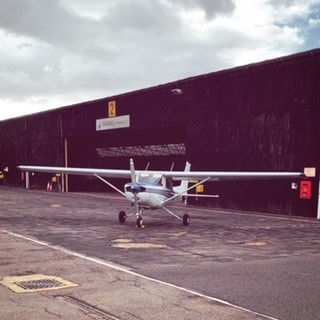
April 12th was given the green light by the UK government as the official date that we could recommence flying lessons. I couldn't wait and so booked in for the 12th, 13th and 16th to fly. To combat skill fade (this is the name given to loss of skills/confidence incurred due to time away from practise), the school decided that all first flights back were to be local area flights, in which there was almost a recap of the skills built up until the point just before lockdown. This was to ensure that instructors could assess accurately the point that students were at, their confidences and anything that might need more work on. Ultimately, it just makes us all safer better, and more intuitive pilots.
I think that first flight back after lockdown 3.0 was one of the best moments of my life. No exaggeration. Flying once a week had saved my mental sanity in Lockdown 2.0 and I really struggled through the most recent lockdown, in the midst of Winter, with nothing to drive me forward. I said to my instructor that I was serious in wanting to complete this PPL in 2021, ideally before we have to start battling the Winter weather conditions again. That doesn't mean rushing through what takes time and experience to understand and get better at, but it means upping frequency of lessons, and some extra study on my behalf.

My journey in reality is just beginning. I'm pre-solo by a couple of hours (and some better landings!), and I have a long way to go. But I've learnt so much in such a short space of time, not just about flying an aircraft, but about myself as student and person, and am in the process of reforming my (what I now realise is) diverse identity in this post-redundancy world. I class myself as so lucky to have got this far, which is more than so many people who I'm sure would love to experience this will ever get. That's why I'm writing this today. I wanted to share my experiences and advice to any of you out there who are thinking about learning to fly, but may have questions and not know who to turn to. Particularly to those of you out there who have faced barriers and hurdles to your dreams, I want you to know that they are possible. It might not be the straight forward path you thought of, it might include a few layovers in places you didn't really want to see, and it probably will involve some sacrifices and difficult decisions. But trust me when I say it's possible. I hope I'm showing that, and I'm looking forward to sharing the next stories from my journey in the skies with you all.
Question and answers:
What has been your favourite part of learning to fly and why?
This is a question in which I expect the answer to change multiple times throughout my flying
'career', but so far my favourite experience has to have been the very first take-off that I operated without the aid of an instructor. Take-off is always exciting. It signifies the start of an adventure, and to be able to say 'I did that!' was the most phenomenal feeling. Oh, and returning to flying after Lockdown 3.0, that truly was the best day ever.
Where are you flying out of and how did you choose your school?
I'm currently flying out of Fairoaks flight centre based in Chobham, Surrey. It's really important that you choose a school that is right for you, so my advice would be to ask people you know, or reach out to people via social media/ flying clubs for their advice, and take a trial flight! Think of it like higher education. You wouldn't go to a college, or university without knowing what was on offer in the form of facilities, and the tutors, so you want to make sure (particularly when you're about to hand over a large sum of money) that you're truly happy. I found my school through a recommendation from a friend, and couldn't be happier with the team of instructors down there.
Do you fly with the same instructors?
I have flown with several instructors now, although I do have one instructor that I tend to book with. This works for me because the one instructor who I fly with the most has worked with me since the very beginning and knows my strengths and weaknesses, probably better than I know them myself. We've built a really good rapport and I trust him which is important when you're learning to do something as technical as learning to fly.
However the good thing about flying with other instructors is you don't get too used to always having the one person you always fly with next to you, particularly important when you think about parts of the training such as your first solo! When you won't have that instructor there, the last thing you want is to get into the air, and then freeze when you realise that there's a space next to you instead of what you're used to.
It's also interesting to see how although all instructors will be flying to the same set of standards and specifications, they will have different experiences that you can learn from, likely coming from a wide range of airlines, and instructing careers and that's been potentially the most fascinating part of flying for me. Each instructor has a 'style' built and designed from their own journey and a part of that will form a part of your style. Knowledge is power, and the more knowledge from multiple sources you have, the better in my opinion.
What aircraft do you fly?
The most common aircraft to fly whilst undergoing your PPL are Cessna 152, and Piper PA28. I fly the Cessna 152, as it works out to be the most cost effective.
How important is increasing diversity in the flight deck to you as a female student pilot, and how are you personally working to help increase visibility and diversity?
This is such an interesting question, as I haven't really thought about myself as a student 'female' pilot before I was asked. I was just another student pilot. However the fact remains that there is still a lack of diversity within aviation, particularly amongst the pilot community, shown simply by the fact that I was asked this question. As a mixed ethnic, female student pilot, I do feel that I have a responsibility to answer this, and work to help increase visibility and diversity for women and other minority demographics.
Before I go any further I just want to say, that I have never been treated any differently in my career, education or training due to my gender, or ethnicity. I am incredibly grateful to have been treated fairly and equally at all points, and to be able to say that. I barely put a second thought to the fact that I may be a minority. I have so many amazing friends and colleagues in the industry who support me wholeheartedly regardless of their identifying factors and I am blessed to be able to say that. However, I'm not oblivious to the fact that bias (conscious and unconscious), and discrimination do exist, and are very much embedded into society and our history.
To put this into context. the Census Bureau (2019) found that in the USA, 94.2% of aircraft pilots and flight engineers identify as male. Leaving a mere 5.8% of the workforce who identify as female. The Air Line Pilots Association International trade union found that globally only 5.18% of pilots are women, and this statistic is lower for the UK, where 4.77% of pilots are women. The Census Bureau found that 86.4% of all pilots in the USA are white, with the next highest majority at just over 5% being white (hispanic). This leaves only a small proportion of pilots identifying as being from a different ethnic background.
These are just some of the many statistics floating around about diversity in the flight deck, or specifically lack of. This is by no means saying that those males in the flight deck are undeserving of their jobs and their careers in the slightest. I would never suggest that, as I believe in a world based upon meritocracy, and equality of opportunity for all and everybody who takes a seat in the flight deck regardless of their gender or ethnicity will have had their own battles, and had to work hard to earn their place. But the reality is that far less women are following a career into the flight deck than men, and in my view there are things that can be done to begin to make this career path more available to women, and like most things, it begins right at the very beginning in childhood. The hidden curriculum (what is taught to children and young people that isn't in the official curriculum) still holds a lot of gender bias and assumption, and this is something we shouldn't shy away from talking about, challenging and changing.
To add to why I want to talk about this, and start to create my own work in increasing diversity, I'm mixed-race, of middle eastern heritage and I am hugely proud of that. I've never seen my ethnicity as a barrier but that's probably largely due to the fact that (and I'm not going to ignore this) I have white skin, blonde hair (albeit dyed), and blue eyes. That in itself I understand through educating myself is a privilege. I also have a family in which education and work ethic has always been encouraged and supported so I know I'm extremely lucky. But I also reckon I'm in the minority with this. It needs to become a possibility for everybody to see a career in the flight deck as an option, regardless of race, gender, ethnicity, or any other identifying factor.
The beautiful thing about history, is that the course of such can always be changed. And there are so many incredible organisations and people out there working hard to improve diversity not only in aviation but also in the workplace in general. In my personal view from my experience in the air, and also as an educator, visibility is key. Young people need to be able to see that people like themselves can have successful careers in the flight deck. Schools, colleges, and community groups need to have access through organisations within aviation (including airlines, groups like the BWPA, and regulatory bodies) to those who would be willing to come into educational settings and talk to young people about their ambitions, and provide advice/mentoring.
This ties in with social media as well. Like it or not, it's here to stay and is one of the biggest sources that influence our young people's minds. By ensuring that those pilots that are of a minority have a platform to speak and connect with young people, we can reach out to a whole new cohort of future aviators by simply saying 'hey, I'm like you, and you can do this too'.
We need to fight the belief that women aren't interested in STEM subjects (that's Science, Technology, Engineering and Maths), and stop accepting this view when it simply isn't true. Yes, it is engrained into society that women will historically study and enter careers of a caring nature, and men will follow technological/engineering pathways but that doesn't mean it's through a lack of interest. Women have historically been engaged in aviation, including working as test pilots and flight instructors during WW2, and therefore this view simply isn't accurate. Yet time and time again, I've heard and read this. Instead of accepting this, we need to tackle the barriers that stop women pursuing a career in the flight deck. We also need to be prepared to call out incidents of racism, sexism, colourism and any discrimination that is seen or heard. This shouldn't have to be an argument or heavy debate, but a mature and educated conversation, however by doing this we begin to break down the stigma surrounding gender and ethnicity within the industry.
This involves providing education and support around financing training, ensuring that organisations are trained and supported to allow those who choose to have a family to do so (there's long standing research that demonstrates that women believe a career in the skies is unavailable to them as a mother), and providing networking opportunities and events to women and those of a minority background to allow them to gain the necessary social capital.
I read something once about equality that stated it's not about lowering any standards, it's about removing obstacles that may exist. When it comes to increasing diversity in the flight deck I think that this summary couldn't be more accurate. I'm still learning, and educating myself in this matter, but I will strive to do all that I can to improve diversity and broaden the range of possibilities of the young whilst in my role.

Do you do any extra studying in between your lessons?
You might be thinking 'how can you study for your lessons without an aircraft', and I guess that's something that I had to learn and refine during lockdown for myself. Pretty early on during my training my instructor introduced me to 'armchair' flying, which is where you run over drills and checks for flight whilst sat in a chair, visualising (or if you're super prepared sat in front of a picture) the controls. Think of it like a rehearsal, and believe me when I say it makes you more confident and prepared for when you do have a lesson.
I also write up notes from every single lesson that I have, so that anything that is learnt and fed back to me as things to work on is noted. This helps me to see the skills that are being built, but also where there's a pattern of inconsistencies for me to work on. I also read the Pooley's manuals on the topic that I'm due to work on prior to my lesson to give myself a little bit of a heads-up on what to expect, and then re-read that chapter after my lesson to consolidate what I've learnt. This also then allows me to note down any questions I still may have, or ideas that I don't quite understand fully, and I can take them into my next lesson with me. I'm at a point now as well where I understand weather charts, and NOTAM's (these are notices that are important as a pilot to take a note of prior to flight) so I'm in a good habit of downloading these prior to leaving my house for flight. Building good habits from the start would absolutely be one of my recommendations to students, as these are habits that you may end up taking through your career.
There are also 9 ground exams to sit prior to gaining your license, so I'm studying hard at the moment to prepare for these. The subjects are:
Air Law
Operational Procedures
Human Performance
Meteorology
Aircraft General Knowledge
Flight Performance and Planning
Navigation and Radio Aids
Principles of Flight
Communications
Your instructor will be able to advise as and when you should start preparing for your exams, and when would be a good time to sit them.
How often do you fly?
On average I try to fly twice a week, but recently I've even managed to squeeze in three per week. In the Summer this is easier as the weather is a lot more consistent than the Winter, where cancellations are more likely. During November/December it was pretty common to not be able to fly all week, so that's definitely a consideration if you're thinking about doing your PPL. If you start in the Spring then you're more likely to get a consistent run of flight in a block than the Winter.
Twice a week is optimum for me I've found, because I can budget and spread the cost well, whilst also making sure I fly enough to build on my skills. Any less and I find I'm not as confident and spend more time recapping fresher skills.
Through my flight training I've also had to navigate around two national lockdowns, where we couldn't fly. The biggest block of 'no-fly' I think amounted to 115 days without a flight. Not only did this result in some skill-fade, it also became challenging to stay motivated and believe this was achievable.
There's no right or wrong answer to this in summary. Some people book lots of lessons in a shorter period, and some will do the odd one here and there. A lot of the deciding factor will come down to finance, and working around life commitments such as full- time work. As with anything make it work for you and your situation.

What part of flying have you struggled with the most and how did you get past this?
The technical part of flying that I have struggled with the most is executing the 'flare' during the landing phase. The 'flare' is where the nose of the plane is raised slightly slowing down the rate of descent, ensuring that the touchdown is managed, controlled, and ultimately safer for the airframe. It's something that comes with experience and time and I can trust in that, but what has been more difficult for me is managing my self-criticism. It can be frustrating as it is less than 10 seconds of a circuit/landing, and for me it has been the hardest part. I can perform technically solid circuits, and then in my eyes, perform a substandard final part of it, leaving me slightly deflated.
My instructors know I'm a perfectionist, and I battle with this during my lessons. It's so important to manage this, as after the landing, in a circuit session you take-off again and have to ensure that your mind is in the moment, building an accurate situational awareness and performing all of the necessary checks for a brand new attempt. If your mind is stuck thinking about what was wrong with your last attempt, you could miss something crucial and end up conducting an unsafe manoeuvre. Again it's down to my instructors that I feel supported in my flight, and they honestly couldn't be better at this. They notice when I need a second to breathe and they take control, they allow me to reflect and guide this reflection, providing thorough de-briefs after every flight, and they make me comfortable enough to ask any question. If I make a mistake, they help me move forward and learn from it. That's why the relationship between you and your instructor is imperative. Trust is the foundation, and it's something I feel so lucky to have found at my school. I owe them all a few bottles of Moet when I gain my license that's for sure!
How have you financed learning to fly? Are there any recommendations you could make to help? Is there anything else to pay for on top of the lessons?
This is undoubtedly one of the biggest obstacles out there for so many people, myself included. There are scholarships out there, which you can apply for but they aren't in abundance, and are highly competitive of course.
As discussed in the main body of my post, it's quite a boring story, but I have saved every single penny I've spent on flying so far from working. I'm so proud of how I've managed to do it, and when I qualify, I can say that the qualification truly is down to my own work and efforts. I saved hard whilst I was flying for the airlines, and work as much as I can alongside my Masters to afford to fly. For example I will fly 8-10am in the morning, and then go to work for a 10 hour shift, and get up the next day to do exactly the same. It can feel slow at times, and I'm lucky that I have no huge commitments in the form of children or a mortgage as I know that is another barrier for so many. My advice would be to work hard, save every extra penny you can, sacrifice things that don't help towards your end goal, and remember when you're doing that extra shift at work, that it's one step closer towards a lesson in the skies.
What are you most looking forward to?
In the interim I'm most looking forward to completing my first solo. Every single pilot I speak to says it's a real milestone, and something that you'll never forget. This point isn't that far away (hopefully!) and it's really driving me in my every day life to keep working and studying hard.
In the long run I'm really excited to be able to fly my family and closest friends who have been my biggest supporters in every single thing that I do from day one, but particularly during the last year when I have really needed their support. I know they can't wait for me to qualify and it would be my way of saying 'thank you for sticking by me' and showing that their support in my flying journey was worth it.
Do you have any plans for further ratings after your PPL? Are you planning on flying commercially?
This is something I'm asked on an almost daily basis, and my answer is probably pretty cryptic. At the moment I'm taking my flying experience one step at a time, and just enjoying every step of the process. I want to keep loving it like I do now for years and years to come, and putting pressure on myself to progress down the commercial flight path will come with an abundance of stresses (for example financial and job prospect stress) that actually could detract from how much I love the actual learning and flying, and impact my performance.
I am planning on continuing flying after my PPL is gained, by adding various ratings on including my night rating, maybe my flight instructor rating, and of course heading towards a commercial pilots license by beginning my hour building experience. You need 150 hours to begin your commercial pilots license training so I'm looking forward to exploring the airfields around the UK whilst I build these hours.
I'd never say never, but equally life could take me down an entirely different path in aviation, one in which I use the skills and experiences learnt from flying combined with my Masters in Human Factors, and experience as crew, and right now I'm open to all options and possibilities including the path to commercial pilot.
If the pandemic has taught me anything, it's that flexibility, being in the moment and enjoying the experience is the key. Stepping back and seeing where life takes you can sometimes be the beautiful beginning that comes out of a painful ending.
What does it feel like when you sit behind the controls?
Being sat in the flight deck, whether it be a Cessna 152, or a Dreamliner, has always been my favourite place to be in the whole world. I've said in this that flying is my therapy, and it truly is that to me. It's this place where a sense of perspective is gifted to you, where you can appreciate the vastness and beauty of the whole world. To actually be sat behind the controls experiencing that, is simply phenomenal.
What advice would you give to anyone just starting out on their PPL?
I'd tell anyone to just 'go for it'. It's certainly one of the most rewarding things I have ever done, and apart from the obvious that it teaches you how to fly an aircraft, you'll learn so much about yourself in the process.
Immerse yourself in the world of aviation. Speak to fellow aviators, those aspiring, and those who've been successful, and share experiences. Read, and read lots. You can never know enough and there is always something else to learn. Study hard, and prepare to make sacrifices. It is a costly investment so not only are you going to have to ensure you have an income to afford it (or a savings account built from working), you need to commit to it fully. It's not something to go into half-heartedly.
This is just the beginning for me, but I'm here to help everybody and anybody who wants to find their beginning, or even to chat to those who have flown much longer and have experienced much more than myself. I'm far from knowing everything, but I'm on this rollercoaster myself, and I'll always be honest and share what I know with those who want. If you have any questions please reach out, and I'll be happy to answer them for you. If I don't know the answer, I'll find out and we can learn together. Don't be scared to fall in the process, remember... 'What if I fall? Oh but my darling, what if you fly?' x










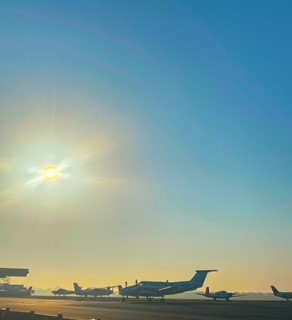
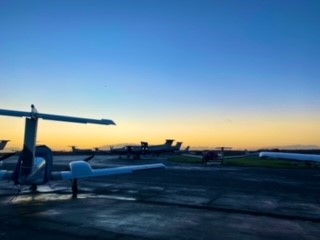
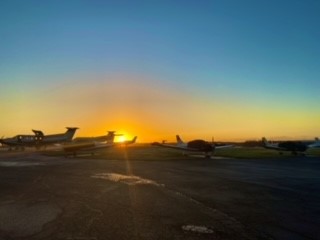







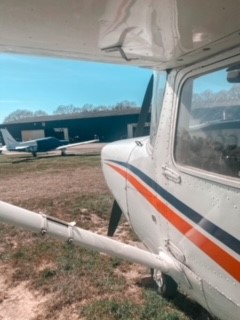

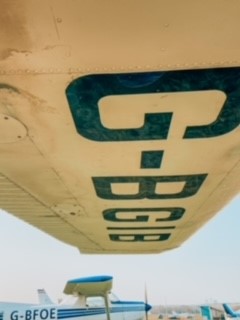
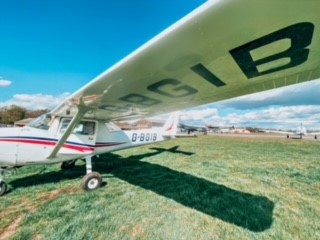
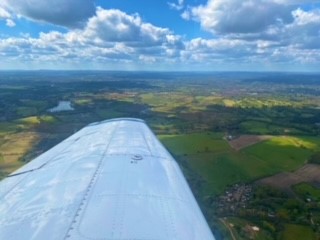
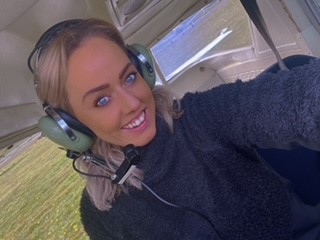

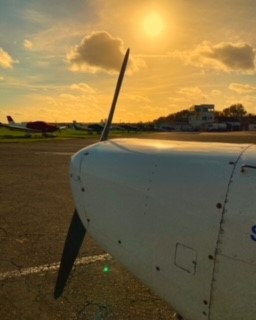


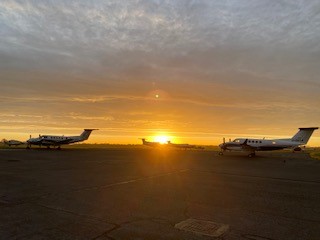


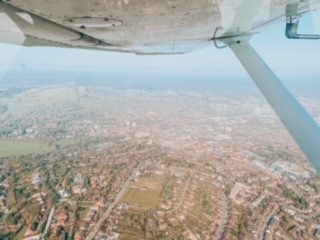

Comments